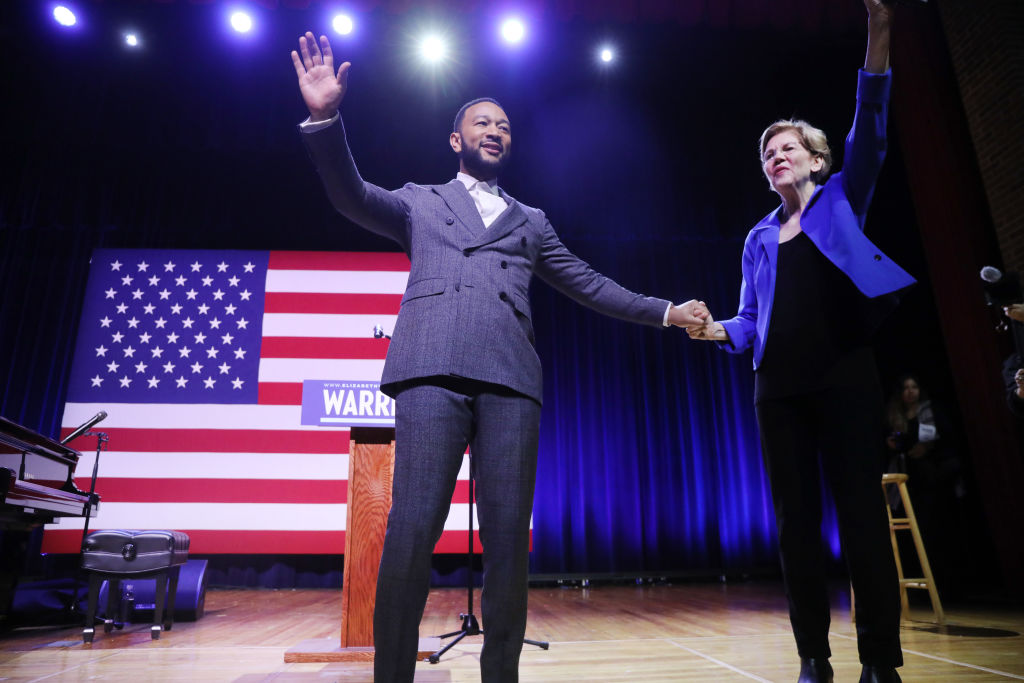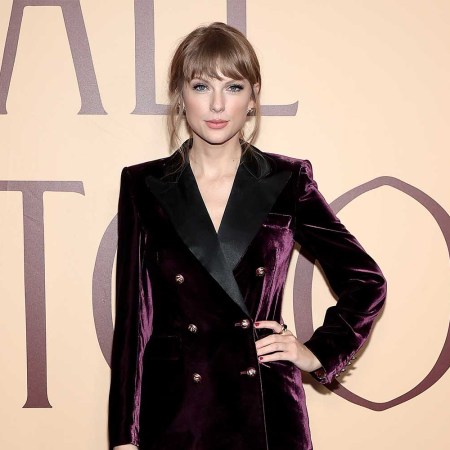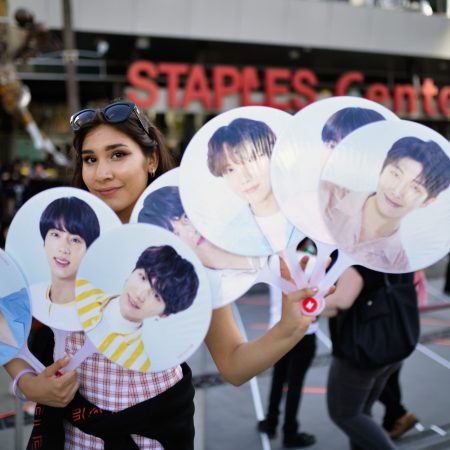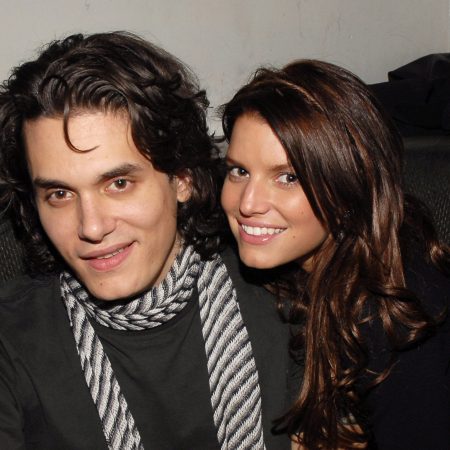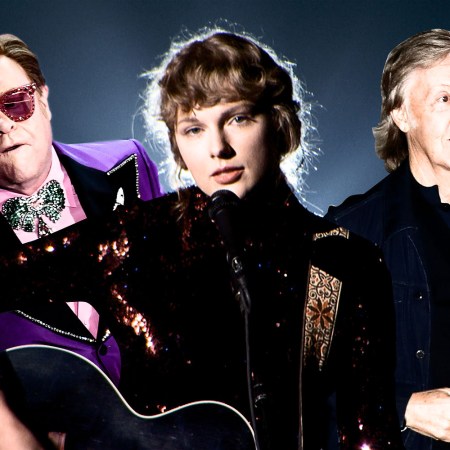By all accounts, Bernie Sanders is not having a great week. The Democratic presidential candidate lost some big primaries on Tuesday — including Missouri, Mississippi and Michigan, the latter of which he won in 2016 — and fell behind in the delegate count, essentially making Joe Biden the party’s presumptive nominee.
It was a disappointing turn of events for a candidate who was the frontrunner just a few weeks ago. It also comes after the senator from Vermont earned an impressive amount of endorsements from popular musicians — everyone from Cardi B to Neil Young to Neutral Milk Hotel’s Jeff Mangum to Public Enemy (sans Flavor Flav) — and even became a meme of sorts after videos of him thanking different artists for performing at his rallies went viral. All of which begs the question: Does getting support from popular musicians actually move the needle at all for politicians?
The short answer would certainly appear to be no. Having Weezer perform at his rally obviously didn’t do enough to prevent Andrew Yang from dropping out of the race three weeks before Super Tuesday, and despite John Legend stumping for her in Charleston, Elizabeth Warren only managed to finish in fifth place in South Carolina’s primary, earning just 7.1 percent of the vote and failing to pick up a single delegate from the state. But while it seems highly unlikely that an undecided voter is going to decide to support Bernie Sanders simply because Ariana Grande does too, political strategists often seem to be counting on just that.
“The group [of voters] that’s really important is the group that doesn’t pay a whole lot of attention to politics — and all of a sudden, Katy Perry, who they like, is paying attention to Hillary Clinton,” Joe Trippi, a Democratic strategist who worked on Howard Dean’s presidential campaign in 2004 and is currently advising Sen. Doug Jones on his reelection bid in Alabama, recently told Billboard. “You’re getting people who don’t tune in, necessarily, to political discourse, to start thinking about that candidate.”
Of course, getting them to start thinking about a candidate and getting them to actually get out and vote are two different things entirely. After she was widely criticized for failing to speak out against Donald Trump or endorse Hillary Clinton in 2016 — a move many speculated was motivated by a fear of alienating her conservative fan base the way the Dixie Chicks did in 2003 with their comments about George W. Bush — Taylor Swift broke her self-imposed “no politics” rule in 2018 ahead of the midterm elections and announced her support for Democratic U.S. Senate candidate Phil Bredesen in Tennessee. Her Instagram post urging her fans to vote blue led to a spike in voter registration; less than 48 hours after Swift made her endorsement, more than 169,000 new voters, most of whom were between the ages of 18 and 29, were registered to vote in the state. But even with the backing of a massive pop star like Swift and fresh block of young voters, Bredesen lost to Republican Marsha Blackburn.
It’s impossible to say whether things would have gone differently if Swift had spoken out sooner. (Texas native Beyonce caught heat the same year for waiting until Election Day to announce her support of Beto O’Rourke’s senate bid against Ted Cruz. “Texas could have gone ‘to the left, to the left’ if Bey had piped up earlier,” the Washington Post declared.) But in a 2019 interview, Swift said her silence three years earlier actually stemmed from concern that her endorsement of Clinton would inadvertently help Trump.
“Unfortunately in the 2016 election you had a political opponent who was weaponizing the idea of the celebrity endorsement,” she told Vogue. “He was going around saying, ‘I’m a man of the people. I’m for you. I care about you.’ I just knew I wasn’t going to help … The summer before that election, all people were saying was, ‘She’s calculated. She’s manipulative. She’s not what she seems. She’s a snake. She’s a liar.’ These are the same exact insults people were hurling at Hillary. Would I be an endorsement or would I be a liability?”
While politicians are quick to hitch their wagons to musicians and nab some intangible “cool points” with certain demographics, Swift’s concern about doing more harm than good isn’t entirely baseless. Certain musician endorsements (especially those from female pop stars) are deemed frivolous, and our reactions to them are rooted in our own biases about who listens to their music. (Do Katy Perry fans, for example, actually not “pay a whole lot of attention to politics,” or is that yet another case of society not taking teen girls seriously?) Even someone like Killer Mike, a pillar of his community with a long history of activism who has been outspoken in his support of Sanders both in 2016 and 2020, constantly has to prove that he actually knows what he’s talking about. Sanders himself expressed some mild concern about the rapper’s endorsement in 2016, telling GQ that “The name got me a little bit nervous. Killer Mike has never killed anybody. It’s just, he’s a killer rapper.” (He also did his best to remind readers that Killer Mike is “a serious guy” and “an extremely bright guy” — the implication being that anyone only vaguely familiar with the rapper would assume otherwise.)
Ultimately, whether or not we take them as seriously as we should, it’s hard to begrudge an artist using their platform to draw attention to the issues they care about and get more people involved in the political process. The stamp of approval from a musician alone isn’t going to win anyone an election (Sanders lost Killer Mike’s home state of Georgia by a whopping 43 percent margin in 2016), but it certainly doesn’t hurt to keep fans — particularly the young ones — engaged with the issues and try to beef up voter turnout numbers, which continue to trail those of most other developed nations. It can often be clunky or come off like pandering, but if artists like the Ratboys or Soccer Mommy can lend a little indie cred to a candidate, why shouldn’t they? The “shut up and sing” mentality is antiquated; musicians throwing their weight behind someone running for office may not necessarily result in victory, but if it leads to even one new voter thinking critically about politics, it’s still a net positive.
This article was featured in the InsideHook newsletter. Sign up now.
